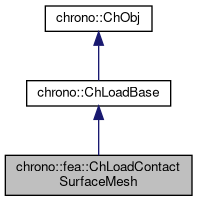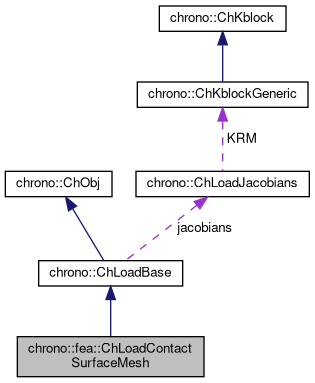Description
Class for applying loads to a contact mesh as a cluster of forces operating on the nodes of the underlying finite elements.
It is useful for doing cosimulation: one can pass this object's vertex & faces to an external software (ex. CFD) that in turn will perform collision detection with its entities, compute forces, send forces back to Chrono via this object. Note, this is based on a cluster of std::vector< std::shared_ptr<ChLoadXYZnode> >, but the class itself could bypass all methods of ChLoadXYZnode and directly implement a more efficient LoadIntLoadResidual_F, however this is left in this way for didactical reasons.
#include <ChLoadContactSurfaceMesh.h>


Public Member Functions | |
| ChLoadContactSurfaceMesh (std::shared_ptr< ChContactSurfaceMesh > cmesh) | |
| virtual ChLoadContactSurfaceMesh * | Clone () const override |
| "Virtual" copy constructor (covariant return type). | |
| void | OutputSimpleMesh (std::vector< ChVector<>> &vert_pos, std::vector< ChVector<>> &vert_vel, std::vector< ChVector< int >> &triangles) |
| A --> B Get the collision mesh in a pointer-less way, where vertex are given in a vector of xyz points, and triangles are given as indexes to the three vertexes in that vector. More... | |
| void | InputSimpleForces (const std::vector< ChVector<>> vert_forces, const std::vector< int > vert_ind) |
| A <– B Set the forces to the nodes in a pointer-less way, where forces are given as a vector of xyz vectors and indexes to the referenced vertex, as obtained by OutputSimpleMesh. More... | |
| void | SetContactMesh (std::shared_ptr< ChContactSurfaceMesh > mmesh) |
| Set the contact mesh (also resets the applied nodes) | |
| std::shared_ptr< ChContactSurfaceMesh > | GetContactMesh () const |
| Get the contact mesh. | |
| std::vector< std::shared_ptr< ChLoadXYZnode > > & | GetForceList () |
| Access the list of applied forces, so you can add new ones by using push_back(), remove them, count them, etc. More... | |
| virtual int | LoadGet_ndof_x () override |
| Gets the number of DOFs affected by this load (position part) | |
| virtual int | LoadGet_ndof_w () override |
| Gets the number of DOFs affected by this load (speed part) | |
| virtual void | LoadGetStateBlock_x (ChState &mD) override |
| Gets all the current DOFs packed in a single vector (position part) | |
| virtual void | LoadGetStateBlock_w (ChStateDelta &mD) override |
| Gets all the current DOFs packed in a single vector (speed part) | |
| virtual void | LoadStateIncrement (const ChState &x, const ChStateDelta &dw, ChState &x_new) override |
| Increment a packed state (ex. More... | |
| virtual int | LoadGet_field_ncoords () override |
| Number of coordinates in the interpolated field, ex=3 for a tetrahedron finite element or a cable, = 1 for a thermal problem, etc. | |
| virtual void | ComputeQ (ChState *state_x, ChStateDelta *state_w) override |
| Compute Q, the generalized load. More... | |
| virtual void | ComputeJacobian (ChState *state_x, ChStateDelta *state_w, ChMatrixRef mK, ChMatrixRef mR, ChMatrixRef mM) override |
| Compute jacobians. More... | |
| virtual bool | IsStiff () override |
| Report if this is load is stiff. More... | |
| virtual void | CreateJacobianMatrices () override |
| Create the jacobian loads if needed, and also set the ChVariables referenced by the sparse KRM block. | |
| virtual void | LoadIntLoadResidual_F (ChVectorDynamic<> &R, const double c) override |
| Adds the internal loads Q (pasted at global nodes offsets) into a global vector R, multiplied by a scaling factor c, as R += forces * c. | |
| virtual void | InjectKRMmatrices (ChSystemDescriptor &mdescriptor) override |
| Tell to a system descriptor that there are item(s) of type ChKblock in this object (for further passing it to a solver) Basically does nothing, but inherited classes must specialize this. | |
| virtual void | KRMmatricesLoad (double Kfactor, double Rfactor, double Mfactor) override |
| Adds the current stiffness K and damping R and mass M matrices in encapsulated ChKblock item(s), if any. More... | |
 Public Member Functions inherited from chrono::ChLoadBase Public Member Functions inherited from chrono::ChLoadBase | |
| ChLoadJacobians * | GetJacobians () |
| Access the jacobians (if any, i.e. if this is a stiff load) | |
| virtual void | Update (double time) |
| Update: this is called at least at each time step. More... | |
 Public Member Functions inherited from chrono::ChObj Public Member Functions inherited from chrono::ChObj | |
| ChObj (const ChObj &other) | |
| int | GetIdentifier () const |
| Gets the numerical identifier of the object. | |
| void | SetIdentifier (int id) |
| Sets the numerical identifier of the object. | |
| double | GetChTime () const |
| Gets the simulation time of this object. | |
| void | SetChTime (double m_time) |
| Sets the simulation time of this object. | |
| const char * | GetName () const |
| Gets the name of the object as C Ascii null-terminated string -for reading only! | |
| void | SetName (const char myname[]) |
| Sets the name of this object, as ascii string. | |
| std::string | GetNameString () const |
| Gets the name of the object as C Ascii null-terminated string. | |
| void | SetNameString (const std::string &myname) |
| Sets the name of this object, as std::string. | |
| void | MFlagsSetAllOFF (int &mflag) |
| void | MFlagsSetAllON (int &mflag) |
| void | MFlagSetON (int &mflag, int mask) |
| void | MFlagSetOFF (int &mflag, int mask) |
| int | MFlagGet (int &mflag, int mask) |
| virtual void | ArchiveOUT (ChArchiveOut &marchive) |
| Method to allow serialization of transient data to archives. | |
| virtual void | ArchiveIN (ChArchiveIn &marchive) |
| Method to allow de-serialization of transient data from archives. | |
| virtual std::string & | ArchiveContainerName () |
Additional Inherited Members | |
 Protected Attributes inherited from chrono::ChLoadBase Protected Attributes inherited from chrono::ChLoadBase | |
| ChLoadJacobians * | jacobians |
 Protected Attributes inherited from chrono::ChObj Protected Attributes inherited from chrono::ChObj | |
| double | ChTime |
| the time of simulation for the object | |
Member Function Documentation
◆ ComputeJacobian()
|
overridevirtual |
Compute jacobians.
Not needed when forces are constant, btw.
- Parameters
-
state_x state position to evaluate jacobians state_w state speed to evaluate jacobians mK result dQ/dx mR result dQ/dv mM result dQ/da
Implements chrono::ChLoadBase.
◆ ComputeQ()
|
overridevirtual |
Compute Q, the generalized load.
- Parameters
-
state_x state position to evaluate Q state_w state speed to evaluate Q
Implements chrono::ChLoadBase.
◆ GetForceList()
|
inline |
Access the list of applied forces, so you can add new ones by using push_back(), remove them, count them, etc.
Note that if you add nodes, these should belong to the referenced mesh.
◆ InputSimpleForces()
| void chrono::fea::ChLoadContactSurfaceMesh::InputSimpleForces | ( | const std::vector< ChVector<>> | vert_forces, |
| const std::vector< int > | vert_ind | ||
| ) |
A <– B Set the forces to the nodes in a pointer-less way, where forces are given as a vector of xyz vectors and indexes to the referenced vertex, as obtained by OutputSimpleMesh.
NOTE! do not insert/remove nodes from the collision mesh between the OutputSimpleMesh-InputSimpleForces pair!
- Parameters
-
vert_forces array of forces (absolute xyz forces in [N]) vert_ind array of indexes to vertexes to which forces are applied
◆ IsStiff()
|
inlineoverridevirtual |
Report if this is load is stiff.
If so, InjectKRMmatrices will provide the jacobians of the load.
Implements chrono::ChLoadBase.
◆ KRMmatricesLoad()
|
overridevirtual |
Adds the current stiffness K and damping R and mass M matrices in encapsulated ChKblock item(s), if any.
The K, R, M matrices are added with scaling values Kfactor, Rfactor, Mfactor.
Reimplemented from chrono::ChLoadBase.
◆ LoadStateIncrement()
|
overridevirtual |
Increment a packed state (ex.
as obtained by LoadGetStateBlock_x()) by a given packed state-delta. Compute: x_new = x + dw. Ex. this is called by the BDF numerical differentiation routine that computes jacobian in the default ComputeJacobian() fallback, if not overriding ComputeJacobian() with an analytical form.
Implements chrono::ChLoadBase.
◆ OutputSimpleMesh()
| void chrono::fea::ChLoadContactSurfaceMesh::OutputSimpleMesh | ( | std::vector< ChVector<>> & | vert_pos, |
| std::vector< ChVector<>> & | vert_vel, | ||
| std::vector< ChVector< int >> & | triangles | ||
| ) |
A --> B Get the collision mesh in a pointer-less way, where vertex are given in a vector of xyz points, and triangles are given as indexes to the three vertexes in that vector.
Similarly to Wavefront .OBJ meshes. Note, indexes are 0-based. These vectors can be later sent to another computing node that computes, say, CFD forces on the mesh.
- Parameters
-
vert_pos array of vertexes (absolute xyz positions) vert_vel array of vertexes (absolute xyz velocities, might be useful) triangles array of triangles (indexes to vertexes, ccw)
The documentation for this class was generated from the following files:
- /builds/uwsbel/chrono/src/chrono/fea/ChLoadContactSurfaceMesh.h
- /builds/uwsbel/chrono/src/chrono/fea/ChLoadContactSurfaceMesh.cpp
